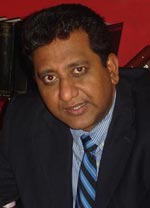
PSC petitions National Assembly for passage of AMLCFT Bill – to be heard at tomorrow’s sitting
THE rapidly approaching November 18 deadline for the passage of the Anti-Money Laundering and Countering the Financing of Terrorism (AMLCFT) Bill has seen increased calls for the House to approve its passage.
The most recent action taken by the Private Sector Commission (PSC) was the presentation of a petition to members of the National Assembly to pass the Bill as a “matter of national and economic priority”.
The Parliament Office yesterday issued a supplementary order paper for tomorrow’s sitting, in which it is stated that the presentation of petitions will be done as a supplementary business on that day.
The PSC said while it notes the concerns expressed by the Opposition parties, no written submissions have been forthcoming as they relate to adjustments to the bill as deemed amendable by the political Opposition. Additionally, the PSC stated, whilst the Bill has been reviewed by the Caribbean Financial Action Task Force(CFATF), and has been deemed acceptable, it has been with the Special Select Committee of Parliament for approximately six months. The AML/CFT Bill was first tabled in Parliament on April 22, 2013.
The PSC reiterated that failure to enact the legislation will result in the blacklisting of Guyana by other countries which will result in severe hardship for the business community and ordinary citizens of Guyana.
The petition also pointed to the repercussions Guyana will face as a result of being blacklisted, observing that foreign banks have already begun to sever ties with local banks and branches. It was also pointed out that remittances which make up 40% of the Gross Domestic Product will be reduced to the detriment of poorer citizens.
It was pointed out that foreign payments regarding goods and services will become difficult, causing delays in imports. Additionally, investors will leave Guyana, bringing a halt to the growth in the economy.
The PSC petitioners are: Aircraft Owners of Guyana; Forest Products Association of Guyana; Georgetown Chamber of Commerce and Industry; Guyana Association of Bankers; Guyana Gold and Diamond Miners Association; Guyana Association of Private Security Organisations; Guyana Manufacturing and Services Association; Guyana Association of Trawler Owners and Seafood Processors; Institute of Private Enterprise Development; Linden Chamber of Commerce, Industry and Development; National Aquaculture Association of Guyana; Rupununi Chamber of Commerce and Industry; Shipping Association of Guyana; Consultative Association of Guyanese Industry Ltd;
Tourism and Hospitality Association of Guyana; Upper Corentyne Chamber of Commerce and Industry; and Central Corentyne Chamber of Commerce.
The CFATF draft report, which is to be issued after the November meeting, has declared Guyana to be a non-compliant jurisdiction, and invites countries to take such counter-measures as they deem necessary to protect themselves from the money-laundering and terrorism risks which Guyana poses.
As Parliament prepares to reconvene sittings of the House tomorrow, calls have been made by various sections of society for the combined Opposition to also be supportive of the legislation that would bring Guyana in line with other Caribbean countries.
President Donald Ramotar has also called on all Guyanese to stand by the government and show support for the AMLCFT Bill. He said many of the arguments put forward by the Opposition parties, with regard to the bill, are being deliberately made more complicated than they actually are.
“This bill is to bring our legislation at the same level as the rest of the Caribbean’s legislation to fight against money laundering, drug trafficking…it’s to close all loopholes where people are getting illicit funds, either from drug trafficking or whatever…so all the countries in the Region will have one legislation,” the President said.
As Chairperson of the Special Select Committee on the AML/CFT Bill, Government’s Chief Whip Gail Teixeira is expected to present the committee’s report on the Bill tomorrow. Stakeholders from the financial sector, in particular, have expressed their concerns over the potential consequences of being blacklisted, should Guyana fail to implement the recommendations of the CFATF.
Minister of Legal Affairs and Attorney General Anil Nandlall said recently that the only window of opportunity for Guyana is for the delegation in November to attend the CFATF meeting with the AMLCFT Bill in hand, which has been passed into law, then it will not be able to prevent the draft report from being adopted.
Opposition Leader David Granger has said the A Partnership for National Unity coalition will not be supporting the amendments to the Bill, due to their absence in the entire process, and the need for it to be properly done. The Alliance For Change (AFC), on the other hand, said it will support the bill, but has stipulated that it will only do so on condition that Government moves to set up the Public Procurement Commission (PPC).
(GINA)







